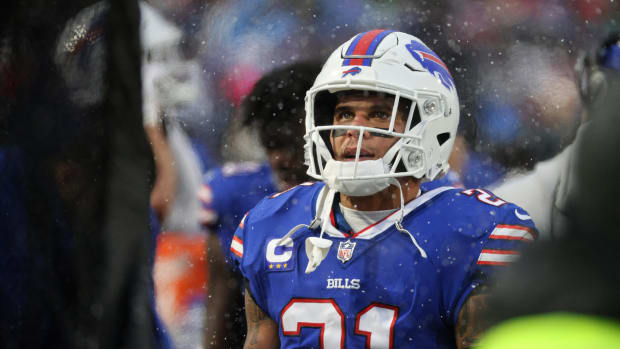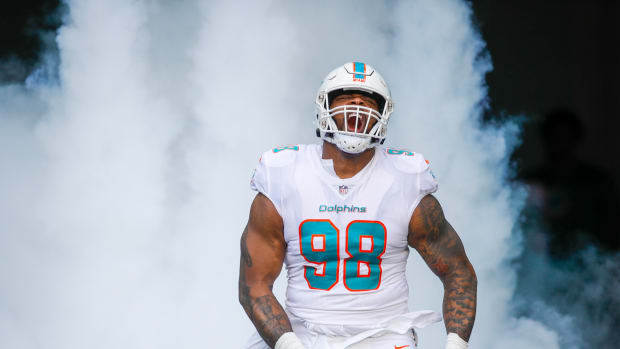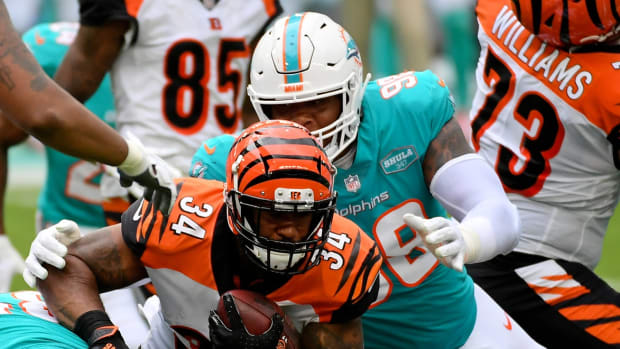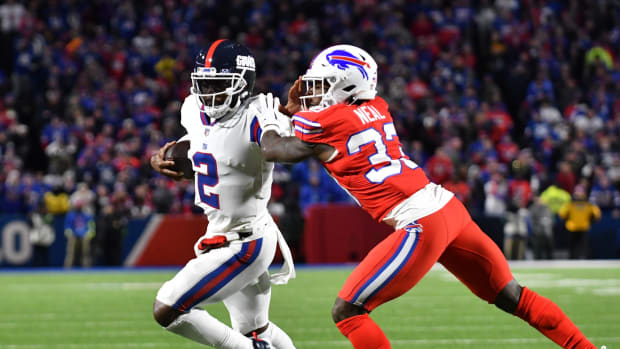Evaluating the Tua Benching from All Angles
It was the benching heard 'round the NFL.
Miami Dolphins head coach Brian Flores' decision to pull an ineffective Tua Tagovailoa in favor of veteran Ryan Fitzpatrick early in the fourth quarter against the Denver Broncos on Sunday certainly attracted a lot of attention.
It was a move that also brought strong reaction from all sides of the issue.
On the one hand, there's the school of thought that it was a temporary setback for the rookie first-round pick and that he should have enough confidence in his ability to not be affected by getting pulled.
On the other, there's the notion that Tagovailoa is the Dolphins' quarterback for the long term and that he should have been given the chance to try to get things corrected against Denver or in a worst-case scenario learn from the experience had he not succeeded.
There's merit to both sides of the argument, so let's try to break it down further.
Let's start with this: There can be zero argument against the fact that Tua was not effective against Denver. None.
Without a doubt, he didn't get a lot of help from the offensive line, which had a tough time dealing with the Denver pass rush. Tua was sacked six times against Denver, but half the sacks came when he had enough time to throw the ball, including one time when he left the pocket prematurely and scrambled out of bounds for a 2-yard loss.
Tua also didn't get a lot of help from his receivers, who had a tough time creating a lot of separation. For example, he attempted three deep passes to Jakeem Grant and all three went incomplete, but Grant was tightly covered on two of those and Tua overthrew him on the other when he failed to set his feet after rolling out.
Here's also what appears undeniable: The Dolphins had very little chance of winning the game with Tua at quarterback.
The Dolphins were down 20-10 with 10:44 left in the fourth quarter when Fitzpatrick entered the game, and Tua did not have a completion longer than 13 yards to that point.
Now, to those pointing to Tagovailoa's impressive 100.1 passer rating on the season, understand that a big part of it is the fact that he's got six touchdown passes against no interceptions — though he's gotten lucky the past two weeks with a ball that went through a Chargers linebacker's hands and a pick against Denver negated by an iffy defensive holding penalty.
But Tua hasn't put up big numbers at all.
He has averaged 148 passing yards in his four starts while completing 61.9 percent of his passes on the season. Some of his admirers won't like to hear this, but Tua has been a game manager since taking over at quarterback.
There was, of course, an exception in the game at Arizona when Tua engineered a tremendous 93-yard drive in the fourth quarter to tie the score 31-31 and pave the way for the inspiring 34-31 victory.
But Tua was sharp from the start in that game, so it was unrealistic to expect he would have been able to do the same against Denver.
Here's a key stat to remember: In the six games that Fitzpatrick started, the Dolphins averaged 354.3 yards of offense; that number is at 240 in Tua's four starts.
Again, they didn't need big offensive production in the victories against the Rams and the Chargers; they did against Denver.
Hence the move to Fitzpatrick.
If the goal is to do whatever is possible to make the playoffs this season, switching to Fitzpatrick against the Broncos made perfect sense.
And, yes, we know about Fitzpatrick's penchant for throwing picks at inopportune times, and we know he did it again against the Broncos.
But he also had the Dolphins within 15 yards of tying the game and putting together a 99-yard drive.
And if you look at the replay of the interception by Justin Simmons, who was the one who had an earlier pick off Tua negated by penalty, maybe you give credit to the defensive player because DeVante Parker did have inside position on his defender and appeared ready to make the catch on the deep slant before Simmons came from the other side to undercut the route.
So now we're left with a question of philosophy and back to whether this season is about trying to make the playoffs or trying to develop Tua.
Or maybe it's both, and in that sense Flores did the right thing to try to win the game at Denver while making clear — as he did afterward — that Tua would be back as the starting quarterback against the Jets next Sunday.
For those concerned about the issue of shaking Tua's confidence, have you heard the kid's media sessions?
Besides, if your franchise quarterback has a confidence issue, maybe he shouldn't be your franchise quarterback, no?
This truly should not be a concern.
The Dolphins are in the thick of a playoff race and should stay in it when you consider their next two games are against the Jets and the now-Joe-Burrow-less Bengals and they're looking at a likely 8-4 after 12 games. They should not be giving up on games because of a desire to give Tua learning experiences.
Besides, the Dolphins played to win all of last year when every victory hurt them in terms of draft position. This has bigger stakes.
In a perfect world, the Dolphins resume their winning ways and the offense starts producing consistently with Tua at quarterback.
But the biggest objective should remain to win games, and that's what Flores was trying to do against Denver.
It may not have been a universally endorsed position, but it was the right one.




